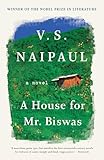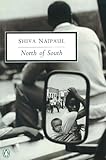His books are long out of print, basically forgotten. And when they were current, his last name always overshadowed his first. But contemporary readers fortunate enough to spend time with Shiva Naipaul, the late younger brother of Nobel Prize-winner V.S. Naipaul, will find the former a true original, perhaps the great lost author of the 1970s. “My choice of career must seem like an exercise in masochism,” he admits in the essay “My Brother and I”:
The paradox is this: I was doing anything but following in my brother’s footsteps when I started to write. Rather, I had taken the first step on the road to independence, to the autonomy that had always been denied me.
A dozen years younger than his celebrated sibling, Shiva Naipaul travelled a remarkably similar route, progressing from childhood in Trinidad to a scholarship at Oxford and eventually, pursuit of the writer’s life in London. Adding to the confusion, the subject matter of his books is, at first glance, remarkably similar to his brother’s, even patently Naipaulian.


 Two rich tragicomic novels set in his native island, Fireflies and The Chip-Chip Gatherers, garnered awards for Shiva Naipaul upon publication in the early ’70s—as well as inevitable comparisons to his brother’s first masterpiece A House for Mr. Biswas. For all their surface similarities to Sir Vidia’s early work, however, the younger Naipaul’s family sagas cast a more humane look upon the extended Indian immigrant clans settled in Trinidad, incorporating rounded, complete female characters and their points of view. Modern concepts of education and ambition bump up against old-world traditions in Shiva Naipaul’s Indo-Trinidadian characters, mixing and mingling in unpredictable, volatile ratios.
Two rich tragicomic novels set in his native island, Fireflies and The Chip-Chip Gatherers, garnered awards for Shiva Naipaul upon publication in the early ’70s—as well as inevitable comparisons to his brother’s first masterpiece A House for Mr. Biswas. For all their surface similarities to Sir Vidia’s early work, however, the younger Naipaul’s family sagas cast a more humane look upon the extended Indian immigrant clans settled in Trinidad, incorporating rounded, complete female characters and their points of view. Modern concepts of education and ambition bump up against old-world traditions in Shiva Naipaul’s Indo-Trinidadian characters, mixing and mingling in unpredictable, volatile ratios.
While her neighbors consider Baby Luchtman, the resilient heroine of Fireflies, to be “too big for she boots,” it’s her uncle, the failed patriarch turned political wanna-be Govind Khoja, who skewers himself with ludicrous ambition:
Deprived of his authority at the head of the family, he was like a fish out of water, breathing in the noxious air of rebellion and insult. Unhappily, in the years since his mother’s death, this is exactly what had happened. Thus, since he was to be debarred henceforth from playing the guru to his own family, he would be guru to the people at large. The purveyor of an incomprehensible doctrine on education could not be challenged or called to account: the masses could only listen, be mystified and obey. So at any rate, Mr. Khoja believed.
 Turning to narrative nonfiction after The Chip-Chip Gatherers came out in 1973, Naipaul invited further comparisons to his brother’s work by documenting a six-month trip through Kenya, Tanzania, and Zambia in North of South: An African Journey (1978). Split between sharply observant travel writing and acidic political interpretation, North of South may work better as opinionated long-form journalism than objective history: It’s slightly anachronistic, and often problematic if judged by current standards. Once—or if—you get past his use of the word “primitive,” Naipaul expresses, and in fact demands, respect for indigenous cultures while unblinkingly documenting the complexities of postcolonial life, confronting the condescending white settlers and decrying their racism.
Turning to narrative nonfiction after The Chip-Chip Gatherers came out in 1973, Naipaul invited further comparisons to his brother’s work by documenting a six-month trip through Kenya, Tanzania, and Zambia in North of South: An African Journey (1978). Split between sharply observant travel writing and acidic political interpretation, North of South may work better as opinionated long-form journalism than objective history: It’s slightly anachronistic, and often problematic if judged by current standards. Once—or if—you get past his use of the word “primitive,” Naipaul expresses, and in fact demands, respect for indigenous cultures while unblinkingly documenting the complexities of postcolonial life, confronting the condescending white settlers and decrying their racism.

 His next book is arguably Shiva Naipaul’s nonfiction apotheosis, and his personal Waterloo. Journey to Nowhere (titled Black and White in the U.K.) places the author in Guyana just days after the Jonestown mass suicides. Struggling to make sense of the senseless, Naipaul provides context and finally, insight into this still-inexplicable nightmare. The most recent account of the tragedy, Jeff Guinn’s The Road to Jonestown: Jim Jones and Peoples Temple (2017), is far more thoroughly researched yet nevertheless pales in comparison to Naipaul’s fitful exploration. Tracing Jim Jones’s strange trip back to his ostensibly progressive roots in the Bay Area, Naipaul indulges in a touch of cliched California-bashing before unearthing the horrible and half-hidden truth about the cult leader:
His next book is arguably Shiva Naipaul’s nonfiction apotheosis, and his personal Waterloo. Journey to Nowhere (titled Black and White in the U.K.) places the author in Guyana just days after the Jonestown mass suicides. Struggling to make sense of the senseless, Naipaul provides context and finally, insight into this still-inexplicable nightmare. The most recent account of the tragedy, Jeff Guinn’s The Road to Jonestown: Jim Jones and Peoples Temple (2017), is far more thoroughly researched yet nevertheless pales in comparison to Naipaul’s fitful exploration. Tracing Jim Jones’s strange trip back to his ostensibly progressive roots in the Bay Area, Naipaul indulges in a touch of cliched California-bashing before unearthing the horrible and half-hidden truth about the cult leader:
Deep racial terror was mercilessly exposed and exploited in the People’s Temple. Jones stripped bare his following and left them naked and defenseless. He did not liberate; he assaulted and traumatized those who believed in him. Once can sense at a certain level his raging hatred for the blacks whose God he claimed to be; a hatred so deep-seated, so tormenting that, it its fury, it turned itself inside out and called itself Love.


 Returning to fiction with Love in a Hot Country (1983), Shiva Naipaul portrays star-crossed lives in a corrupt and ravaged Caribbean nation after the revolution. His voice and vision are decidedly bleaker here yet no less compelling than in the previous novels. A stunning collection of essays and short stories titled Beyond the Dragon’s Mouth appeared in 1985—the same year Shiva Naipaul died suddenly of a heart attack at age 40. In the introduction to the posthumous collection An Unfinished Journey (1987), Naipaul’s father-in law Douglas Stuart recalls asking him about a return to the comic vein of his initial fiction. Naipaul replied: “How can I? I have walked over the bodies at Jonestown.” But he was far from exhausted. “Beyond The Dragon’s Mouth,” an autobiographical essay first published in 1984, relays the depth, and fortitude, of his inspiration:
Returning to fiction with Love in a Hot Country (1983), Shiva Naipaul portrays star-crossed lives in a corrupt and ravaged Caribbean nation after the revolution. His voice and vision are decidedly bleaker here yet no less compelling than in the previous novels. A stunning collection of essays and short stories titled Beyond the Dragon’s Mouth appeared in 1985—the same year Shiva Naipaul died suddenly of a heart attack at age 40. In the introduction to the posthumous collection An Unfinished Journey (1987), Naipaul’s father-in law Douglas Stuart recalls asking him about a return to the comic vein of his initial fiction. Naipaul replied: “How can I? I have walked over the bodies at Jonestown.” But he was far from exhausted. “Beyond The Dragon’s Mouth,” an autobiographical essay first published in 1984, relays the depth, and fortitude, of his inspiration:
I grew up in a no-man’s land. Suburban life with its ease and unrelenting worship of American standards, American ideals, had not existed when I was a boy. Its assumptions and prejudices were unfamiliar to me. If I was like a fish out of water at a Hindu rite, I was no less a fish out of water at a drive-in cinema with the vapors of hot dogs and hamburgers. Such definition as I do now posses has its roots in nothing other than personal exigency. Every day, I have to redefine myself.
In his abbreviated oeuvre, Shiva Naipaul conducts a restless search to comprehend the world at large, and himself. Whatever his further journeys, both real and imagined, might have revealed, he left us plenty to unpack.









